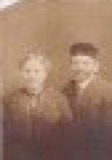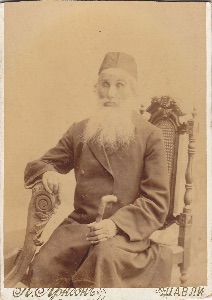Vabalninkas, Lithuania
Ogince Family


10 November 2016
Eli,
As indicated by references in numerous sources, there is an extensive group of families named Ogince-Ogints-Ogintz-Ogens with roots in Vabalninkas. Some of them have been linked genealogically and others not yet. My own tie to the group is through my maternal grandmother, who was Rivke (Rive, Rebecca) Ogints and born in Vabalninkas in 1860. I learned from the Kaunas Archives that her father was Meyer Ogints (born in 1820) and she had four brothers (Lazer Yankel, Sholim Edidie, Girsh David, and Movsha Aron). The latter three (with name changes) migrated to the U.S. Meyer was known to have at least one brother, named Israel, with at least three children named Abram Itsik, Benzel Mordechai, and Sore. Lior Ogintz of Tel Aviv and relatives are descended from Benzel Mordechai. As you know, I am acquainted with Owen Ogince of Australia, who I think is possibly descended from Lazer Yankel. It would be interesting if descendants of these and other Ogince-Ogints-Ogintz-Ogens families could have their DNA compared to determine extent of linkages.
Charlie
Charles B. Nam
KUM MAYN ZUN, DUS IS FRAYTIK, LORMIR GEYN DAVENEN
(Come my son, it is Friday, let us go and pray)
Theunissen, a small country dorpie (village), situated in the Vrystaat (OFS, South Africa), approximately three hours drive from Johannesburg.
Oom (uncle) Jackie, was well-known in this village, but he was also known as Oom Jackie, Die Jood (The Jew) by many who always added “The Jew” to his name.
Yacov Ben Osher, referred to as Jankel was born in Vabalninkas, Lithuania. His parents, sensing the forthcoming war danger, told him to leave his country of birth and join his two sisters in South Africa. In 1929, aged 15, unable to speak English and with hardly any money, he arrived in Cape Town, was processed with the name of Jackie Ogince and made his way to his family in the Orange Free State.
Within days, he became a shopkeeper, even although he was unable to speak English or Afrikaans. His residence was a storeroom at the back of the shop and during the next few years, he taught himself to speak, read and write both languages. His general dealer shop prospered and in 1941, he married Miriam Ruth Eisenstein from Zastron, another small village in the OFS.
Theunissen, with an approximate white population of 2,000 had approximately 48 Jewish families in the 1930 to 1950 period. The synagogue, with Reverend Mitavsky and subsequently Reverend Israel, was the focal point of this active and vibrant Jewish community. Various Jewish organizations, including The Union of Jewish Women, Women’s Zionist League and HOD were extremely active and many businesses, owned by the Jewish families prospered.
My first eleven years were in Theunissen. By then, many of the Jewish families had moved to the capital cities of South Africa and only about 12 families remained during my school years, but the synagogue never missed a service with Rev. Israel in charge and kosher food, chedar and Jewish activities continued. I especially remember Sukkoth when days were spent decorating the Succah, as well as a certain Pesach when I was about 4 years old and the four glasses of wine made me “ongeshnosket” (drunk) resulting in an early departure from the seder.
In 1957 when I commenced school, I was the only Jew at the school and soon became acquainted with anti-semitism. Numerous occasions come to mind when I was singled out by a fellow or senior student about being a Jew and my first fight at the age of 6 was against a classmate who had called me a …….. Jew. It was also not unusual to see me being tackled by my own team mates (always in error), playing rugby. Each time anti-semitism came my way, my parents would always remind me that I must always stand up for my rights and beliefs and that we are proud to be Jews. With this advice, I somehow managed to cope, although with a face bruised and bloodied, I did manage to arm myself in my own Jewish way – I became best mates with the village policeman’s son and anti-semitism was no longer a huge problem for me.
Eventually, only one Jewish family remained in Theunissen, the Ogince Family. But, the synagogue continued. Every Friday, it was cleaned and I remember the cleaner asking my father why he had to clean the entire synagogue, as only two people came to pray each week. His answer was that one day the synagogue will be full again, which brought doubt to the cleaner as in his mind, it was not possible. Every Friday night, my father would say “kum mayn zun, dus is fraytik, lormir geyn davenen” (come my son, it is Friday, let us go and pray) and we would walk the 10 minutes to the synagogue, passing various families who would be sitting on their stoeps (verandahs). They would always greet us, but sometimes with a remark that was anti-semetic.
Kosher food continued. Each Friday, we would go to the railway station to collect our box of kosher meat, which came from Bloemfontein. Major Jewish holidays were never a problem. The shop as usual closed for those days and we were off to Welkom, a city about 30 minutes away, where we would spend yomtov.
In 1962, The Theunissen synagogue was jam packed. The cleaner could not believe his eyes. Family and friends came from all over South Africa to celebrate my barmitzvah. My mother who was a specialist baker had put on a spread for that weekend that is still spoken of to this day. Theunissen had an occasion to remember, but sadly this was the last time that the synagogue was full.
For the next 15 years, the synagogue continued to be cleaned, painted, broken windows were replaced and every Friday evening, Jackie Ogince davened in his shul. His wife passed away in 1971 and he remained on in Theunissen in the same shop and synagogue that he found in 1929. Prior to Jackie leaving for Johannesburg in 1975, the synagogue was demolished, the land sold and the torahs, furniture and artifacts were given to the Welkom and Edenvale Hebrew Congregations and a substantial amount was donated to a hospital in Bnei Brak, Israel. Jackie Ogince passed away in 1978.
Whenever I visit Theunissen, many residents often reminisce about the synagogue that my father continued to preserve, his success as a general dealer, farmer and wool and skins buyer, my mother’s baking, being the first and only female Jewish town councilor and her continuous devotion to her family. I do however remind them about the anti-semitism that I have never forgotten.
Owen Ogince
22/8/03



Meyer Ogintz
Rebecca Huff nee Ogints



